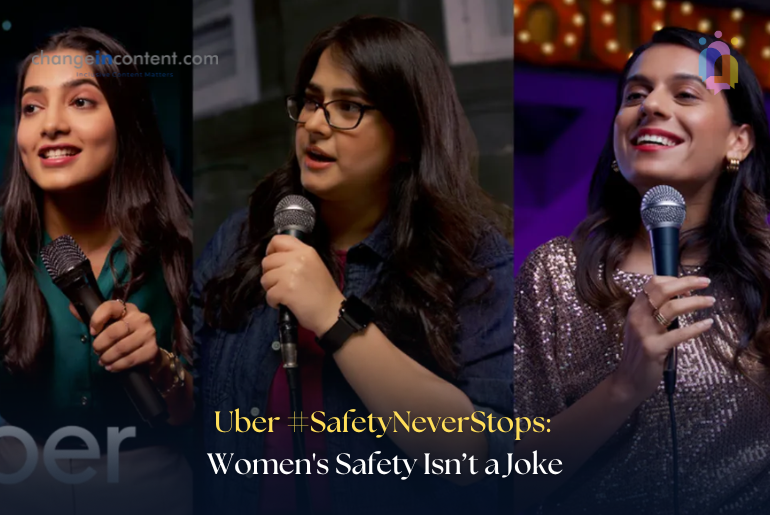The Uber #SafetyNeverStops campaign is doing rounds on the internet. With this campaign, Uber adds a humorous yet thoughtful twist to women’s safety.
A 10-month-long survey by Youth Ki Awaaz and the Observer Research Foundation, with participation from 4,262 women across 140 Indian cities, analysed how safety concerns influence women’s experiences with public transport and their mobility choices. It found that 90% of women feel unsafe travelling after 8 pm. Most respondents preferred travelling between 9 am and 5 pm, with 71% feeling safest during these hours. In contrast, less than 1% felt secure travelling between 12 am and 7 am, with 45% identifying it as the most unsafe.
Even during peak hours, safety is still a concern, showing that the problem isn’t just about the time or location but a constant fear women face. To address this, Uber launched its #SafetyNeverStops campaign with a bold and thought-provoking message: ‘Women’s safety isn’t a joke’.
Uber #SafetyNeverStops campaign: Women’s safety is not a joke
The #SafetyNeverStops campaign, featuring stand-up comedians Shreeja Chaturvedi, Shreya Priyam Roy, and Shashi Dhiman, includes nine candidly shot films set in public spaces like markets, offices, and transit stations. Each film portrays the everyday choices women make to stay safe, turning these moments into humorous yet thought-provoking stories.
The campaign stresses how women should not have to feel privileged or lucky to travel safely. Safety should be a basic right for women as anyone else, without it being a luxury or exception.
In one scene, Shashi Dhiman jokes about being into adventure sports because she goes out alone late at night in Gurgaon. She compares it to any adventure sport, saying the goal is the same—to make it home safely. It brings our attention to the harsh reality that 44% of women aged 16 to 34 have experienced catcalls, whistles, unwanted sexual comments, or jokes, and 29% have felt they were being followed.
Shashi Dhiman also humorously points out that a woman always has to practice “sharing is caring.” However, it is not done by sharing food, clothes, or makeup. Instead, it’s about sharing her location with her mother, father, brother, or uncle just to stay safe. She also jokes that her skincare routine is not as complicated as her nighttime travel routine, which involves memorising every route on the map.
Before the shot ends, she adds, “These jokes might be funny, but women’s safety isn’t.”
Uber’s commitment to women’s safety
With around 17 million rides per day globally, Uber is not immune to issues like sexual and physical violence. It is an issue that affects all industries and communities. However, the company has implemented safety features to ensure both riders and drivers experience a secure and seamless journey. According to the 2024 India Economic Impact Report, 95% of women list safety as their main reason for using the app, while 84% of women users believe Uber is the safest way to get home.
The Uber #SafetyNeverStops campaign is part of Uber’s continued focus on providing safe transport options, especially for women, in India. This campaign also highlights the new safety features it has rolled out, such as:
- Safety Preferences: Allows riders to customise features like RideCheck, Share My Trip, and Audio Recording for specific times or locations.
- Women Rider Preference: To enhance safety, women drivers have the option to accept only women riders, especially during late hours.
- Audio Recording: Enables riders and drivers to record audio during trips, adding an extra security layer. Encrypted recordings are accessible only when submitted in a safety report.
The final thoughts: A small step in a long journey for safety
Uber shows that starting a conversation, even with a touch of humour, can help break the silence around women’s safety. However, in a country where women’s safety is threatened every day, hour, and minute, the Uber #SafetyNeverStops campaign is just one step. While well-intentioned, Uber’s initiative feels more like a reminder that we still have a long way to go before we can genuinely say women are safe in public spaces.
Let’s not overlook that Uber hasn’t simply used this as an opportunity to promote its brand. The stand-up comedians in the campaign have approached the points raised with genuine empathy and understanding.
So, as Uber takes this small step, do not forget the bigger picture: it’s time to do more than talk. Safety is the right of every woman, not a favour.
Disclaimer: The views expressed in this article are based on the writer’s insights, supported by data and resources available both online and offline, as applicable. Changeincontent.com is committed to promoting inclusivity across all forms of content, which we define broadly to include media, policies, law, and history—encompassing all elements that influence the lives of women and gender-queer individuals. Our goal is to promote understanding and advocate for comprehensive inclusivity.


